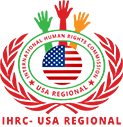ABOUT HUMAN RIGHTS DEFENDERS
“Human rights defender” is a term used to describe people who, individually or with others, act to promote or protect human rights, also known under international law as birthrights. Human rights are fundamental rights inherited by birth. Anyone can be a human rights defender.
Human Right Defenders and IHRC-USA Regional
International Human Rights Commission-USA Regional Inc accept volunteers as defenders on behalf of the Declaration of Human Rights. This deems viable due to the United States constitution infringement committed by sworn officers of the color of office and title, who took an oath to uphold the United States Constitution and being a signatory to treaty law, and the Universal Declaration of human rights set forth by the UN against every ‘person’ defined by law.
What do human rights defenders do?
All human rights for all
To be a human rights defender, a person advocate and addresses any human right (or rights) on behalf of individuals or groups despite of race, religion, faith, sex, nationality, or national origin. Human rights defenders seek the promotion and protection of civil and political rights as well as the promotion, protection, and realization of economic, social, political, and cultural rights recorded in the 30 Articles of the Universal Declaration of Human Rights.
Human rights defenders are to address any human rights concerns, which can be as varied as, for example, Ones faith and belief, summary executions, police profiling, torture, arbitrary arrest, rights to a nationality, and detention, female genital mutilation, discrimination, employment issues, forced evictions, women rights, access to health care, and toxic waste and its impact on the environment.
The term “human rights defender” has been used increasingly since the adoption of the Declaration on human rights defenders in 1998. Until then, terms such as human rights “activist”, “professional”, “worker” or “monitor” had been most common. The term “human rights defender” is seen as a more relevant and useful term.
Local, national, regional, and international action
The majority of human rights defenders work at the local or national level, supporting respect for human rights within their own communities and countries. IHRC- USA Regional is based in New York State/USA and extends its position globally in line with A.M. E.E.S.A inc.
The defenders must understand that the main counterpart authorities are charged with ensuring respect for human rights within a province or the country. As Defenders you may be placed to monitor a regional or worldwide human rights situation and submit information to regional or international human rights mechanisms set up by our office, including the special rapporteurs of the United Nations Commission on Human Rights and United Nations treaty bodies. Increasingly, the work of human rights defenders is mixed, with the focus being on local and national human rights issues, but with defenders contacting regional and international mechanisms which can support them in improving human rights in their countries it deems a more professional interaction of negotiations for satisfactory results. Remember, diplomacy is always the best approach.
Supporting better governance and government policy
Some human rights defenders focus on encouraging a government to fulfil its human rights obligations, for example by publicizing information on the Government’s record of implementation of human rights standards and monitoring progress made. Some defenders focus on good governance, advocating in support of democratization and an end to corruption and the abuse of power on an executive, Judiciary and Legislative level, and providing training to a population on how to vote and why their participation in elections is important.
What should a defender’s required study, research and code of conduct be and why?
All Defenders should study and have a copy of the:
- Declaration of Human Right book (You can also get it online)
- The Constitution and State Constitution.
- UN Charter.
- They should know their governmental representatives in their national government and State.
- Every human rights defender should respect the federal, state or county laws of their country.
- A person who does not know their rights doesn’t have any.
- Make sure to obtain the Criminal and Penal Law Cod book along with a black law dictionary.
- You don’t have to be an attorney or a paralegal to be a defender of Human Rights (The director of the Defenders Department is as certified paralegal from NYS Paralegal School). If you have a law background through school, company, or law firm it is a plus. If there are attorneys interested, please make mention of your background.
Viable links:
https://www.state.gov/u-s-support-for-human-rights-defenders
https://www.ohchr.org/en/civic-space/declaration-human-rights-defenders
https://www.nps.gov/elro/learn/historyculture/udhr.htm
How do I become a Human Rights Defender?
You must download the application click here, complete it and mail it in or scan and email it. Afterwards someone will contact you.
Please take notice that IHRC-USA Regional have annual dues. The dues are contributions to our youth annual program, such as our Community Global Ambassador Tour to the UN and other Annual events listed on the application.
However, if you wish to ONLY participate as a Defender, you will not be required to pay annual dues. If you wish to contribute towards our great cause for change your contributions will be highly appreciated. PLEASE click the above link for more information.

